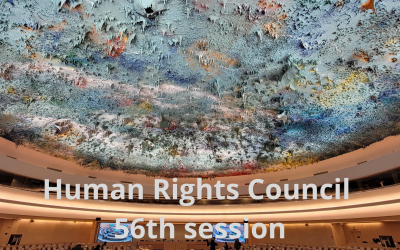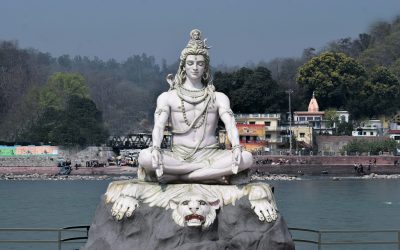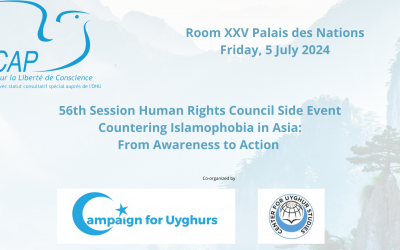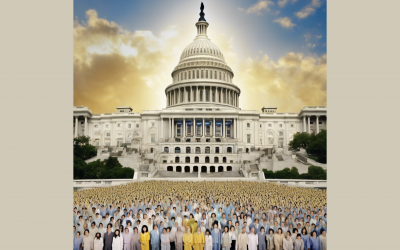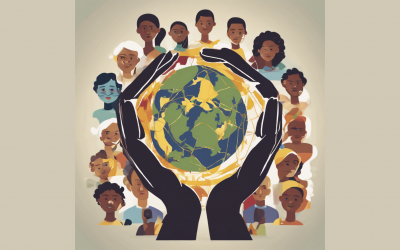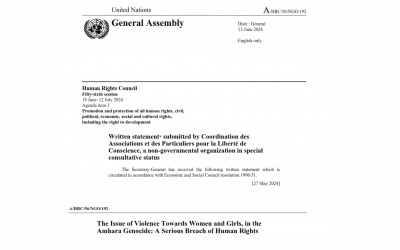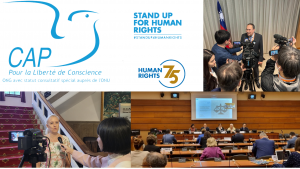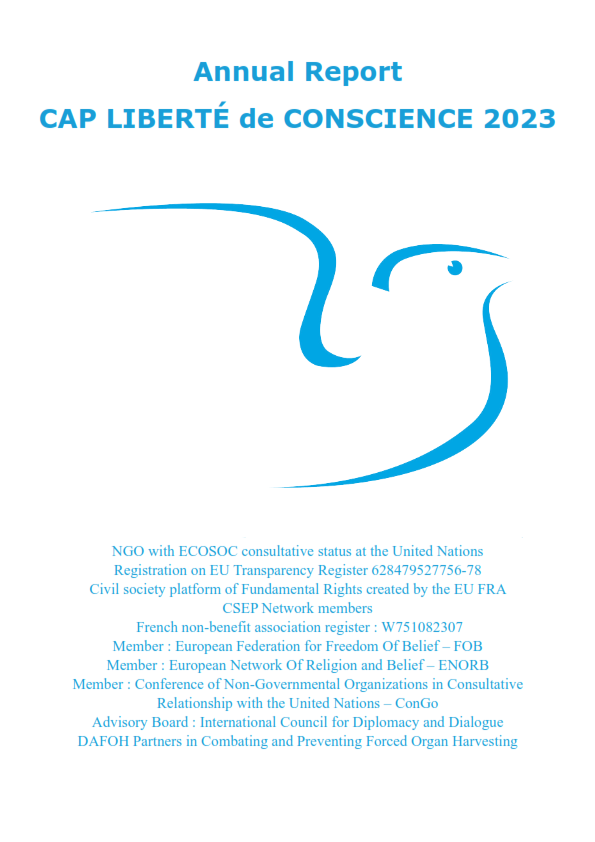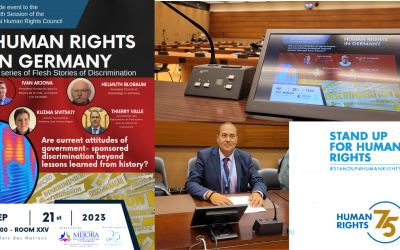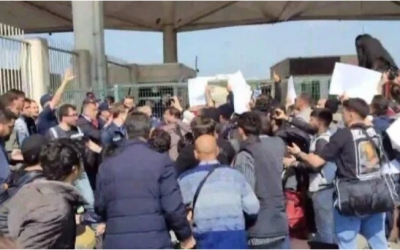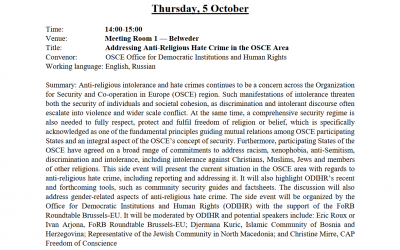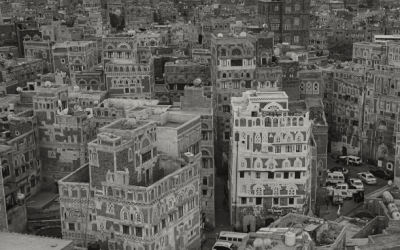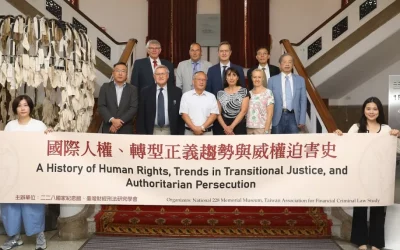
What is “Coordination des Associations et des Particuliers pour la Liberté de Conscience” (CAP Freedom of Conscience)?
CAP Freedom of Conscience is a secular European NGO with United Nations Consultative Status, created in 1995 and dedicated to protect the Right of Freedom of Religion and Belief.
CAP Freedom of Conscience combats all forms of discrimination based on religion or belief by alerting European and International bodies.
CAP Freedom of Conscience collects testimonies of discrimination and human rights violations affecting religious or belief communities in order to disseminate them to international bodies, and in order to raise awareness and inform them as well as to generate debate on the protection of Freedom of Religion and Belief.
CAP Freedom of Conscience also advocates for any religious or spiritual group facing discrimination to have their right to Freedom of Religion and Belief recognized.
CAP Freedom of Conscience is a member of the European Federation for Freedom of Belief (FOB), European Network Of Religion and Belief (ENORB) and participate to the Civil Society Platform of Fundamental Rights created by the EU Fundamental Rights Agency DAFOH Partners in Combating and Preventing Forced Organ Harvesting
Ethiopia Item 3: Interactive dialogue with the Special Rapporteur on trafficking in persons, especially women and children
We urgently draw your attention to the ongoing genocide against the Amhara people in Ethiopia, a crisis ignored by this council and its member states. Amhara women face catastrophic realities, including trafficking, gang rape, torture, and witnessing the brutal killings of their loved ones.
Frances Crackdown, on Hindu and Yoga Followers; An Alarming Trend of Religious Intolerance
A report[i] by CAP LC (Coordination des Associations et des Particuliers pour la Liberté de Conscience) has brought to light Frances concerning stance towards these practices. The report, titled “Spirituality, Yoga and France; Finding a Balance ” outlines how the government has attempted to marginalize and stifle the practice of yoga and other movements inspired by Hinduism.
56th Session Human Rights Council Side Event on “Countering Islamophobia in Asia: From Awareness to Action”
In recent years, the rise of Islamophobia in Asia has emerged as a critical challenge to religious freedom and human rights across the region. This side event aims to transform dialogue into dedicated action, highlighting effective strategies and fostering international cooperation to address and mitigate Islamophobia.
U.S. House Approves Landmark ‘Falun Gong Protection Act’ to Defend Religious Freedom and Human Rights
A significant moment, in history occurred as the United States House of Representatives approved the “Falun Gong Protection Act” (H.R.4132) signaling a step towards safeguarding rights and religious freedom. This legislation, championed by Representatives Scott Perry and Thomas Suozzi stands as a beacon of hope for Falun Gong followers who have endured human rights violations in China since 1999. The bill aims to address and combat the persecution faced by this group emphasizing values of truthfulness, compassion and forbearance. Through measures outlined in the act efforts are made to hold perpetrators of violence, repression and torture against Falun Gong practitioners accountable. Among its provisions are sanctions imposed by the President targeting individuals and entities complicit in human rights abuses, against Falun Gong adherents through visa bans and asset freezes.
Protecting the Rights of Minority Groups; Efforts, by Civil Society
In a step towards addressing minority concerns the United Nations Special Rapporteur on minority issues has called upon civil society organizations worldwide. The appeal is for contributions to a report focusing on the role of NGOs in advocating for and safeguarding minority rights set to be presented at the UN General Assembly in 2024.
HRC 56 The Issue of Violence Towards Women and Girls, in the Amhara Genocide A Serious Breach of Human Rights
The Coordination des Associations et des Particuliers pour la Liberté de Conscience a governmental organization with special consultative status has presented a written submission to the 56th session of the Human Rights Council shedding light on the serious human rights abuses taking place in Ethiopia especially targeting the Amhara community. The submission underscores the violence faced by Amhara women and girls framing it within a context of genocide against the Amhara people.
CAP Freedom of Conscience involvement in Europe
Ahmadi Muslims in Germany who’ve fled state persecution are being deported back to Pakistan and it’s putting their lives at risk
Thousands of Ahmadi Muslims in Germany who have fled severe religious persecution in Pakistan are awaiting a decision on their asylum applications. They belong to a religiously and politically persecuted minority – the Ahmadiyya Muslim Community. It is recognized around the world by human rights groups that Ahmadi Muslims are constantly, ruthlessly persecuted.
Turkish court rules in favor of 101 Ahmadi religion detainees
In a side-event of the 54th session of the Human Rights Council in Germany, director of CAP Freedom of Conscience, Thierry Valle, has delivered an oral statement emphasizing the urgent need to grant asylum/humanitarian visas to the 101 members through EU consulates in Turkey as the only way available means to safeguard their right to freedom of religion and their right to life and freedom from inhumane or degrading treatment.
Side-event of the 54th session of the Human Rights Council UN Human Rights In Germany
Since May of this year, over 100 Ahmadis from various countries where they were heavily persecuted, have been detained by the Turkish authorities in Edirne Immigration Detention Center. They want to apply for asylum in an EU country.
Those people from the Ahmadi Religion of Peace and Light do not want to stay in Turkey, another Muslim majority country, where people also consider them infidels and treat them as such.
Addressing Anti-Religious Hate Crime in the OSCE Area
Anti-religious intolerance and hate crimes continues to be a concern across the Organization for Security and Co-operation in Europe (OSCE) region. Such manifestations of intolerance threaten both the security of individuals and societal cohesion, as discrimination and intolerant discourse often escalate into violence and wider scale conflict. At the same time, a comprehensive security regime is also needed to fully respect, protect and fulfil freedom of religion or belief, which is specifically acknowledged as one of the fundamental principles guiding mutual relations among OSCE participating States and an integral aspect of the OSCE’s concept of security. Furthermore, participating States of the OSCE have agreed on a broad range of commitments to address racism, xenophobia, anti-Semitism, discrimination and intolerance, including intolerance against Christians, Muslims, Jews and members of other religions. This side event will present the current situation in the OSCE area with regards to anti-religious hate crime, including reporting and addressing it. It will also highlight ODIHR’s recent and forthcoming tools, such as community security guides and factsheets. The discussion will also address gender-related aspects of anti-religious hate crime. The side event will be organized by the Office for Democratic Institutions and Human Rights (ODIHR) with the support of the FoRB Roundtable Brussels-EU
Strengthening Freedom of Thought Conscience Religion and Belief in Yemen
Violence in Yemen in 2023 has seen an uptick , including an increase in targeted attacks and violent speech towards religious minorities. On 25th May 2023, Houthi militia stormed a peaceful meeting of Bahais in Sana’a and arrested 17, including five women, and continue to detain 11 of them incommunicado. In 2 June 2023, the UN High Commissioner on Human Rights reported how the Mufti Shamseddin Sharafeddin, appointed by leaders of the Houthi militant movement, accused the detained Bahais of being apostates and saying “they should be killed,” if they did not repent Similar hate speech and incitement has been recorded in Yemen towards Christian converts and others since the start of the conflict and was raised during the virtual 53rd Human Rights Council parallel event co-sponsored by the Slovak Republic Bureau of the Special Envoy for Freedom of Religion or Belief.
Axiom Justice Has No Time Limit Government transitional justice should not set its own limits
Whether or not transitional justice is implemented is the basic condition for examining the establishment of a human rights nation. As Christine Mire, vice president of the French CAP-LC (Coordination for Freedom of Conscience of Individuals and Organizations), emphasized, Taiwan is one of the few countries that can turn the relics of past government abuses into museums, and despite Taiwan’s commitment to democracy, the failure to solve the Taijimen case has tarnished Taiwan’s reputation as a democracy. The government should face up to the fact that Taiwan’s international reputation should be preserved.

